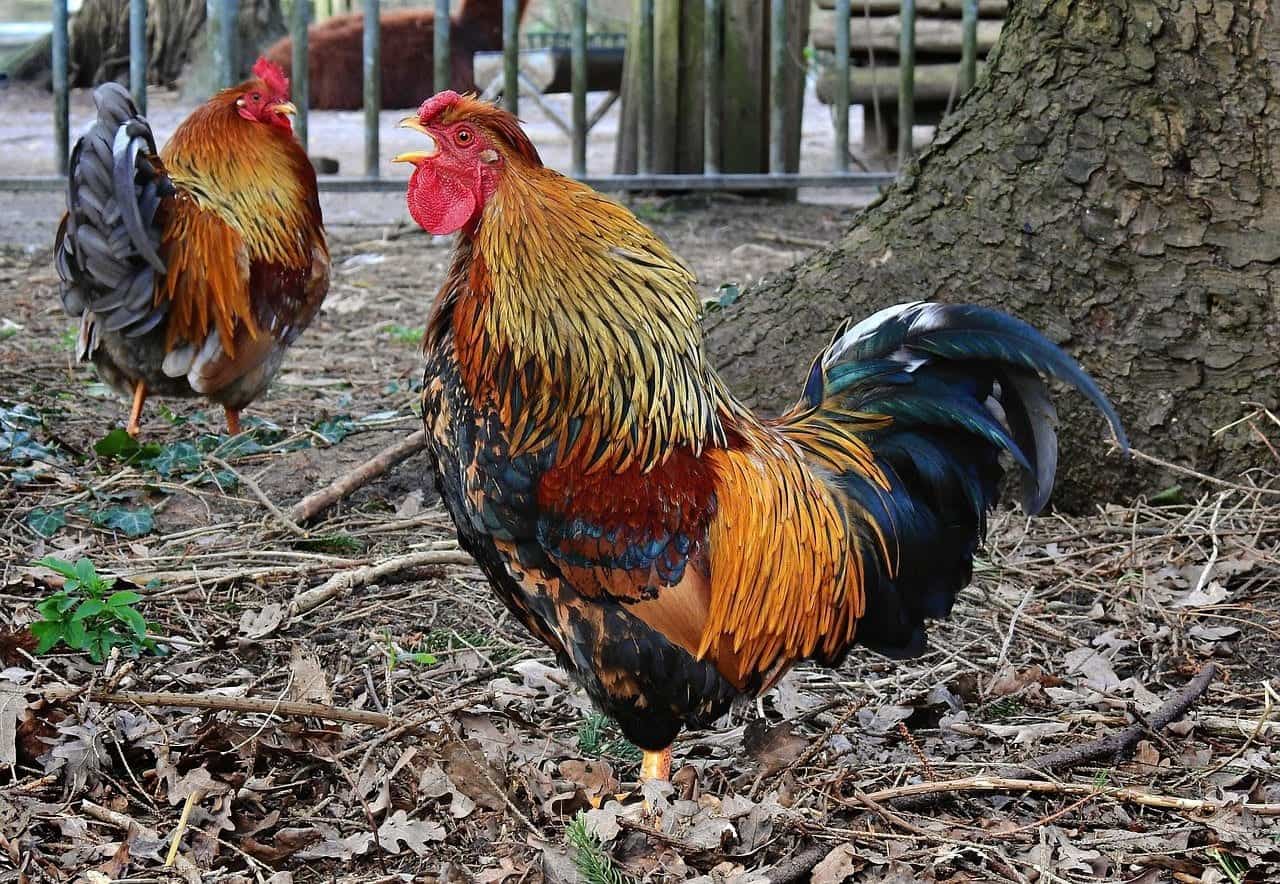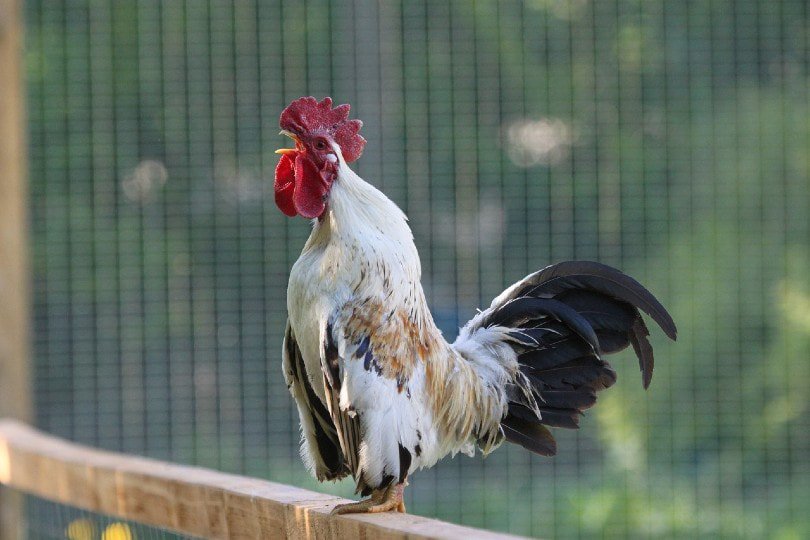Whether you keep chickens as domesticated pets or farmyard animals, they’re among the most vocal animals that you can look after. As a tightly knit flock, they keep tabs on each other by vocalizing their locations. Their distinct sounds also enable them to call for help or sound the alarm if they feel threatened.
We put together this list of common chicken sounds so you can better understand what your chickens are talking about and how well they’re getting along.

The 10 Common Chicken Sounds With Meanings
1. Alarm
If you have a cat or a dog, you’ve probably heard your chickens alert each other to the presence of your four-legged best friends. Their alarm calls can vary depending on the perceived threat level, but it’s a good idea to keep a note of what each alert sounds like so you know when you need to check on your flock.
There are two particular calls to pay attention to and your chickens’ usage of them depends on the threat that they’ve spotted, whether it’s a ground predator or a hawk flying overhead.
Ground Level Threat:
This call is a series of repeated clucking noises. Fast-paced and loud, it can sometimes sound like cackling. The closer the threat gets to your chickens — whether it’s your cat or an intruding fox — the louder and more insistent your chickens will get.
Air Raid Siren
For aerial predators, like hawks, you’ll hear your chickens give a much louder warning. This call sounds a little like a siren. It’s a loud shriek or a scream, and your chickens will run for cover.
If you have a rooster, you’ll more than likely hear him sound the alarm, but dominant hens will alert the others too, especially when you don’t have a rooster present. There are occasions when roosters get a little too happy to sound the alarm, often for no real reason. In this case, you’ll find your hens start to listen to other members of the flock over “the rooster who cried wolf.”
2. Broody Hen
Mothers of any species can be protective of their young, and the same goes for broody hens. If you have a hen sitting on a nest of eggs, she’s probably told you off a few times for getting too close. These noises are distinct growls and hisses. Don’t be silly enough to assume that your hen is all bark and not bite — she won’t be afraid to accompany her vocal warning with a sharp peck if you do stray too close.
Broody hens are the grumpiest chickens that you can encounter, and it’s always best to give them a wide berth. Perhaps give them their own water and food dish so they don’t have to venture too far from their eggs.
3. Chick Sounds
Although they’re fluffy and adorable, chicks can make just as much noise as their adult flock mates. While they don’t have as wide a range of noises as fully grown chickens, they have enough of a variety to keep you updated on how they’re faring.
If you raise your chicks away from the rest of the flock and their mother, it’s up to you to make sure their needs are met, and learning about the noises that they make will help you understand what they need.
Happy
Like their adult counterparts, chicks cheep to show that they’re content. It’s a soft and cheerful noise that is sure to put a smile on anyone’s face.
Startled
Siblings, even the chicken variety, are bound to come to blows now and then. If one of the chicks sneaks up on another and pecks them, you’ll hear a high-pitched, loud peep from the unaware chick.
Distress
The cheeping that chicks use to show their distress is similar to their content cheeping but higher in pitch, repetitive, and distinctly unhappy sounding. You’ll hear this distress whenever they’re hungry or too cold.
Fear
High-pitched, repetitive, and fast-paced, these peeps are sounds that your chicks will make whenever they’re taken away from their mother. They’ll quieten down as soon as they feel safe again.
Panic
A step up from distress, this cheeping is also high-pitched and loud but more persistent and panicked. This is their cry for help.
4. Contentment
The most common noise that you’ll hear your chickens make is a happy murmuring. They’ll often use this while they forage, as a way of keeping tabs on each other even if they wander off.
Another variation on these happy noises is a soft, quiet warbling that some chicken owners refer to as “purring.” Chickens that are familiar with being petted will make this noise whenever you fuss over them, or you’ll hear it during their dust baths on warm, sunny days.
5. Coop Noise
Chickens are social creatures, and they’ll bid each other and you good morning and good night. When you open and shut the coop, you’ll hear them chatter to each other as they prepare for their day and when they settle down to sleep. They’ll be louder in the mornings when they wake up and sleepier in the evenings.
6. Crowing
The most recognizable noise that chickens make is crowing. Roosters will start the morning with a loud “cock-a-doodle-do” and announce their presence with the same call throughout the day.
For flocks with more than one rooster, the dominant one always crows first, followed by the others. It’s your rooster’s way of claiming his territory and his position over the rest of the flock.
In some cases, hens have been known to crow, too, but this is rare.
7. Dinner Call
Roosters should take good care of their hens, and this includes calling them over whenever he finds food, whether he’s stumbled across a log full of juicy bugs or you’ve tossed out feed for them. He’ll stand over the food and make a repetitive clucking sound to call the hens over.
8. Egg Song
Just as roosters have their distinguished crowing, hens also have their own noises. This is particularly apparent when they’re laying an egg or waiting to get into their favorite nest box.
The noise itself is a steady “buk-buk-buk ba-gwak” sound, and hens that are miffed with one of their peers hogging the nest box will be loud and persistent as they try to convince the other to move aside. Depending on the hen’s place in the pecking order, this request is either listened to or completely ignored.
9. Mother Hens
If you let your brooding hen look after her eggs and chicks herself, you’ll quickly realize that she never stops talking to her young. From the moment that she starts incubating the eggs, she’ll be quietly clucking to them to get them used to the sound of her voice, coax them out of their shells, and keep them out of trouble.
Hens also make the same dinner call that roosters do when they find food suitable for their chicks to eat.
10. Nesting Spot
Another way that roosters can take care of the hens in their flock is by creating nesting spots. They’ll do their best to create the perfect nests, making a quiet, focused clucking noise the whole time before presenting their attempts to the hens.

FAQ
Now you know about the common noises that chickens make, you’re probably curious about why chickens are so vocal. We answered a few frequently asked questions so you can learn more about your chickens’ habits.
Why are my chickens so noisy?
No matter what breed you look after, your chickens will make noise. It’s actually more concerning when they don’t make noise. This usually means there’s something wrong, like an illness or some kind of injury.
Your chickens are noisy simply because that’s how they communicate. This is why it’s a bad idea to force them to be quiet; their vocalizations tell each other when something is wrong. It’s also why roosters are often not allowed within city limits — with how loud their crowing is, they’re often the noisiest chickens.

Can I train my chickens to be quiet?
Some people do train their chickens to be quiet, but it’s not recommended. Chickens “talk” to warn each other of threats and to make sure they know where the rest of their flock is, especially when they wander off during foraging.
There are quieter breeds — Australorps are one example — but they still have the same talkative habits, even if they are a little more reserved than Welsummers, for instance.
Chickens are usually only quiet when something is wrong. Even keeping a hen-only flock will only slightly limit the amount of noise that they make. There won’t be any obnoxious crowing from a rooster, but you’ll still have hens’ loud egg songs to contend with.
How do I learn what my chickens are saying?
Different breeds will have different ways of vocalizing, but the common sounds are all inherently the same. The best way to familiarize yourself with your chickens and their language is by watching them. By paying attention to how they communicate and interact with each other, you’ll be able to learn what each of their noises means.

Final Thoughts
Chickens make various noises to communicate with their flock. They warble, chirp, and even purr. When you throw in the loud warnings that they give each other whenever they see a threat, the noises that they make can be obtrusive and a little concerning.
Noisy chickens are normal, however. While some breeds can be quieter than others, they’re all chatterboxes, and if you’re in city limits, you’re bound to hear protests from your neighbors, even with a hen-only flock.
Understanding the common sounds that your chickens make will help you understand what they’re saying to each other and when they need your help to fend off a predator.
Featured Image Credit: Kurt Bouda, Pixabay
